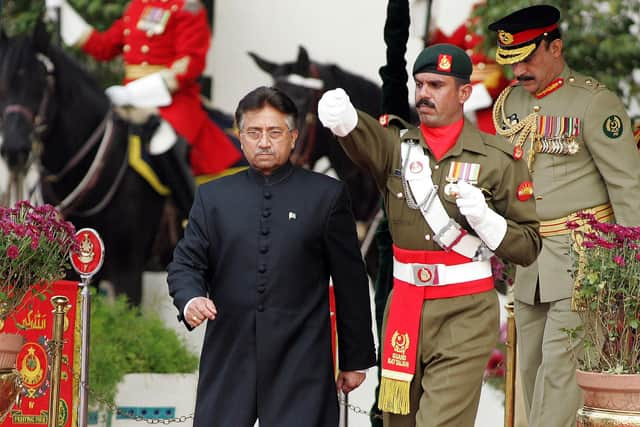Pakistan’s former military ruler Pervez Musharraf dies aged 79
He was the military ruler who seized power in a bloodless coup and later led a reluctant Pakistan into aidin g the US war in Afghanistan against the same Taliban fighters his nation murkily backed even as Islamic militants twice targeted him for assassination.
Gen Musharraf, a former special forces commando, became president through the last of a string of military coups that hit Pakistan after its founding amid the bloody 1947 partition of India.
Advertisement
Hide AdAdvertisement
Hide AdHe ruled the nuclear-armed state after his 1999 coup through tensions with India, an atomic proliferation scandal and an Islamic extremist insurgency.


He stepped down in 2008 while facing possible impeachment.
Later in life, Gen Musharraf lived in self-imposed exile in Dubai to avoid criminal charges, despite attempting a political comeback in 2012. His family announced last June that he had been in hospital for weeks while suffering from amyloidosis, an incurable condition that sees proteins build up in the body's organs.
Shazia Siraj, a spokeswoman for the Pakistani consulate in Dubai, confirmed his death and said diplomats were providing support to his family.
"I have confronted death and defied it several times in the past because destiny and fate have always smiled on me," Gen Musharraf once wrote. "I only pray that I have more than the proverbial nine lives of a cat."
Current Pakistani Prime Minister Shahbaz Sharif offered his condolences in a short statement, saying: "May God give his family the courage to bear this loss."
Pakistan, a nation which is now home to 220 million people, drew US attention a little under two years after he seized power due to its border with Afghanistan.
Al Qaida leader Osama bin Laden launched the September 11, 2001 attacks in 2001 from Afghanistan, sheltered by the country's Taliban rulers, and Gen Musharraf knew what would come next.
"America was sure to react violently, like a wounded bear," he wrote in his autobiography. "If the perpetrator turned out to be al Qaida, then that wounded bear would come charging straight toward us."
Advertisement
Hide AdAdvertisement
Hide AdBy September 12, then-US secretary of state Colin Powell told Gen Musharraf that Pakistan would either be "with us or against us". Gen Musharraf said another American official threatened to bomb Pakistan "back into the Stone Age" if it chose the latter.
Gen Musharraf chose the former. A month later, he stood by then-president George W Bush at the Waldorf Astoria in New York to declare Pakistan's unwavering support to fight with the US against "terrorism in all its forms wherever it exists".
Pakistan became a crucial transit point for Nato supplies heading to landlocked Afghanistan – even though Pakistan's powerful Inter-Services Intelligence (ISI) agency had backed the Taliban after they swept into power in Afghanistan in 1994. Before that, the CIA and others funnelled money and arms through the ISI to Islamic fighters battling the 1980s Soviet occupation of Afghanistan.
Comments
Want to join the conversation? Please or to comment on this article.